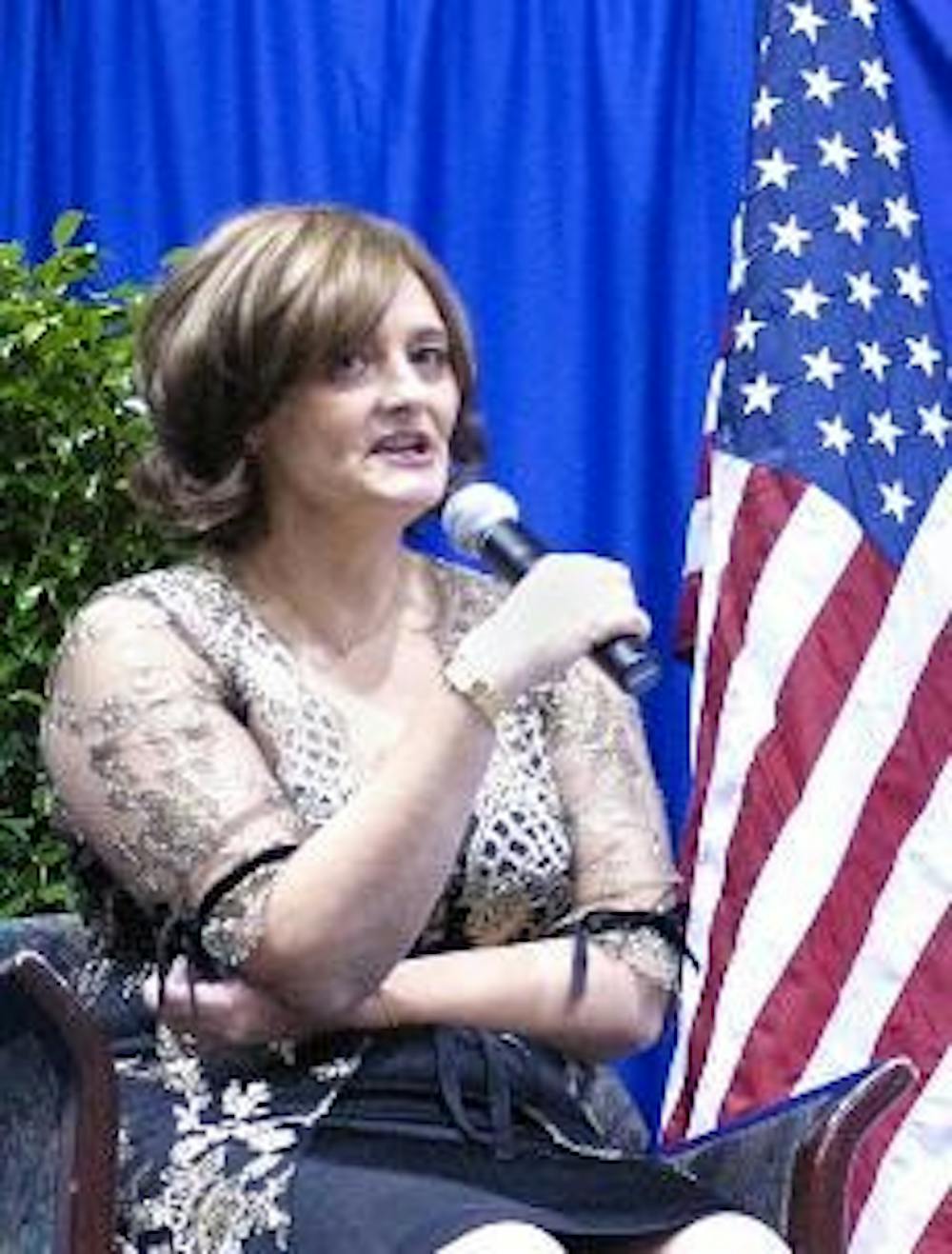Though the United States was the "first nation in the world founded on respect for human rights," its membership in two key international human rights documents would advance its position as a global human rights leader, said Cherie Booth Blair, wife of British Prime Minister Tony Blair, during her Family Weekend speech Saturday.
Booth, a British attorney and member of the Queen's Counsel, was brought to campus by the Kennedy Political Union in conjunction with College Democrats and Women's Initiative. Her speech, titled "Dialogue or Disinterest: The U.S., Human Rights and the World," focused on a variety of topics related to human rights and particularly the unique role the United States plays on the world stage.
Booth discussed the impact of younger Americans on the world.
"Students have a huge role to play in this country's future, and because of that, the future of the world," she said. "The more I see of this generation ... the more comforted I am that the world will be in really safe hands," despite "it being popular today to decry the world's youth."
She then discussed the history and development of human rights over the past century. "This country and its constitution are cornerstones" of the human rights movement, Booth said.
The United States' failure to ratify two documents, the United Nations Convention on the Rights of the Child and the Rome Statute, drew criticism from Booth, who noted that the United States is one of only two countries in the world that have not signed the Convention on the Rights of the Child. The other is Somalia.
The Convention on the Rights of the Child "balances the welfare of children ... with the right of children to be involved and participate in issues that affect them," according to Booth, who also cited important economic, social and political rights the convention provides, as well as calling it a "step in the right direction." Child soldiers, the use of anti-personnel land mines and the malnutrition of 130 million children worldwide were cited as further evidence of the necessity of the convention.
The United States' failure to ratify the CRC is "a position that sits strangely with the United States' role as a promoter of human rights," Booth said. "These children look to the rest of us to shield and nurture them."
Booth addressed what she feels are "unfounded concerns" that the United States has about ratifying the Rome Statute, which would make it party to the International Criminal Court. She noted that there are other "open democracies" who have ratified the statute and who have put their trust in the ICC system. The Rome Statute, which the United States has signed but not ratified, is the international treaty that established the International Criminal Court. The International Criminal Court has jurisdiction over three offenses: war crimes, crimes against humanity and genocide.
Chris Palko, a sophomore in the School of Public Affairs, said he disagreed with this part of her speech because he is "not in favor of the ICC."
"I don't want to see a lot of soldiers tried in The Hague," he said.
Booth also talked about the U.S. Supreme Court's reluctance to rely on other countries' judicial systems as precedents for domestic rulings.
"Domestic judges are using a global set of rulings and standards," she said. "Comparative law is vital to democracies across the world."
KPU Director Taylor Robinson said she was pleased with Booth's appearance on campus.
"It was a pleasure to have her as a guest at the university," she said. "She's incredibly warm and vivacious, and she took on a very serious subject."
AU students had a variety of reactions to the speech.
"I thought it was well done, but the thing that concerned me a little was that she had a little too much attitude toward the United States [about] urging us for the Convention on the Rights of the Child," said Robbie Schwartz, a sophomore in SPA. "We can look at practices of the British and see some interesting issues."
Georgette Spanjich, a freshman in SPA, said she appreciated Booth's speech because it "says something about women and political leadership, which I think is a big theme at AU."
Katie Olson, a junior in SPA, said her message was unusual but positive.
"There was a very specific call to action to students of AU as future legislators to ensure that the United States plays an active role in the development of international law," she said.
Booth's speech took place in Bender Arena. Her appearance was a substitution from the original Family Weekend billing that included Chris Matthews of MSNBC's "Hardball." Matthews cancelled in the last week of September due to an "overriding professional engagement," The Eagle previously reported.
QUICK FACTS | CHERIE BOOTH BLAIR
> Born in Liverpool, England > Graduated from the London School of Economics as the first and only person (to this day) to achieve her law degree with a first-class grading in all her subjects > Married Tony Blair in 1980 > Stood for British Parliament in 1983 > Became a Queen's Counsel in 1995 > Co-founder of Matrix Chambers law group in London > Wrote "The Goldfish Bowl," a look at other wives of British prime ministers throughout history > Mother of four > Specializes in public, employment and European community law





